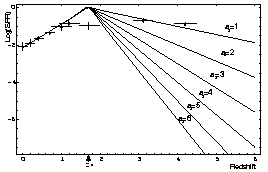
The jet-disk symbiosis model for Gamma Ray Bursts: cosmic ray and neutrino background contribution
Giovanna Pugliese1, Heino Falcke1, Y. P. Wang2,3, & Peter L. Biermann1,4
1Max-Planck-Institut für Radioastronomie, Auf den Hüugel 69, D-53121 Bonn, Germany (pugliese, hfalcke, plbiermann@mpifr-bonn.mpg.de)2 Purple Mountain Observatory, Academica Sinica, Nanjing 210008, China
3 National Astronomical Observatories, Chinese Academy of Sciences
4 Department of Physics and Astronomy, University of Bonn, D-53121 Bonn, Germany Germany}
Astronomy & Astrophysics (2000), in press
Abstract:
The relation between the cosmological evolution of the jet-disk symbiosis model for GRBs and the cosmic rays energy distribution is presented. We used two different Star Formation Rates (SFR) as a function of redshift and a Luminosity Function (LF) distribution to obtain the distribution in fluence of GRBs in our model and compare it with the data. We show a good agreement between the fluence distribution we obtain and the corrected data for the 4B BATSE catalogue. The results we obtain are generally valid for models that use jet physics to explain GRB properties. The fluence in the gamma ray band has been used to calculate the energy in cosmic rays both in our Galaxy and at extragalactic distances as a function of the redshift. This energy input has been compared with the Galactic and extragalactic spectrum of cosmic rays and neutrinos. Using our jet disk symbiosis model, we found that in both cases GRBs cannot give any significant contribution to cosmic rays. We also estimate the neutrino background, obtaining a very low predicted flux. We also show that the fit of our model with the corrected fluence distribution of GRBs gives strong constraints of the star formation rate as a function of the redshift.
Paper: Available in PostScript and (A&A)LaTex. Please send an email request to hfalcke@mpifr-bonn.mpg.de for a preprint.
Other publications can be found here.
Questions: Heino Falcke, hfalcke@mpifr-bonn.mpg.de